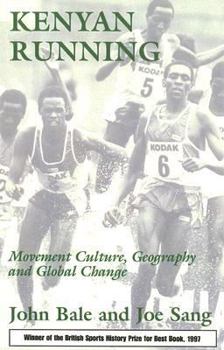Kenyan Running: Movement Culture, Geography and Global Change
Select Format
Select Condition 
Book Overview
1997 British Society of Sports History - Lord Aberdare Literary Prize for Sports HistoryThe record-breaking achievements of Kenyan athletes have caught the imagination of the world of sport. How... This description may be from another edition of this product.
Format:Paperback
Language:English
ISBN:0714642185
ISBN13:9780714642185
Release Date:September 1996
Publisher:Routledge
Length:228 Pages
Weight:0.85 lbs.
Dimensions:0.5" x 6.1" x 9.2"
Customer Reviews
2 ratings
This book helps you understand Kenyan running.
Published by Thriftbooks.com User , 25 years ago
This book is a must read for anybody that is interested in running. Everyone always wonders why the Kenyans are such good runners? This detailed, and interesting, book allows you to learn and understand the people of Kenya, and also why they are such good runners. Throughout their turbulant history it seems as though games, or sporting events, have been an important part of their culture. Becasue of their deep rooted cultural activites, as well as the colonial influence from the British, the Kenyans have been able to excell at events that revolve around running. Bale and Sang bring fourth a lot of information that allows you to learn about running in Kenya, and also the impact the Kenyans have had on runners around the world yesterday, today, and into the future.
Excellent account: emergence/development of Kenyan athletics
Published by Thriftbooks.com User , 27 years ago
How are we to explain the seemingly phenomenal success of East African athletes in the sport of track and field? One approach, advocated by Roger Bannister, former mile world record holder and currently a consultant neurologist, is to explain such success in biological terms. During 1996, in a series of speculative statements, not grounded in any `scientific' facts, Bannister highlighted the importance of `race' in determining thesuccess of East African athletes. On reading Kenyan Running, it is clear that, on this occasion, Bannister is firmly on the wrong track. John Bale and Joe Sang have produced an excellent account of the emergence and development of Kenyan athletics. This carefully crafted text demonstrates, time and again, the socio - cultural determinants of sporting success. In offering a cogent, social scientifically based account, Bale and Sang provide a clear riposte to advocates of biological determinism. In particular, in chapter six, the environmental and racial myths associated with `Kenyan' success are carefully dissected. Besides, who are these `Kenyan' men who succeed in specific athletic events? This book provides the answers. The debunking of biological determinism is an important achievement in itself. This book, however, does more than this. It has several other virtues. In Kenyan Running we see not only the theoretical advocacy, but also the empirical demonstration, of an approach to the study of sport that draws on geography, history and sociology. While I would have liked the authors to have been even more explicit in this regard, the book provides a very good example of the potential stemming from a blending of different disciplines. No doubt, advocates of these disciplines would have liked to have seen more of `their' knowledge base in the book, but what has been produced provides an important pointer to what inter - or multi - disciplinary research can achieve. Bale and Sang also provide a detailed account of a century of Kenyan involvement in modern athletics and, in doing so, assess the role of tribal traditions, colonial heritage and `development' processes. In these areas they provide a solid account of the actual dynamics involved. Drawing on traditional geographical methods, but also in keeping with new geographical directions, the authors provide a series of astute historical geographical insights. They are not content, however, to explain the `success' of Kenyan athletics solely in terms of `internal' developments. The authors show how such processes have to be explained in terms of the globalization of sport. This connection between Kenyan athletics and the global sport system is another virtue of this book. For them, the emergence of Kenyan athletics is bound up with the globalization of sport. Drawing on Wallerstein's World System theory, Bale and Sang interpret Kenyan athletics in terms of a process of `underdevelopment'. Far from western coaches and sporting aid assisting Kenyan athletics uniform






